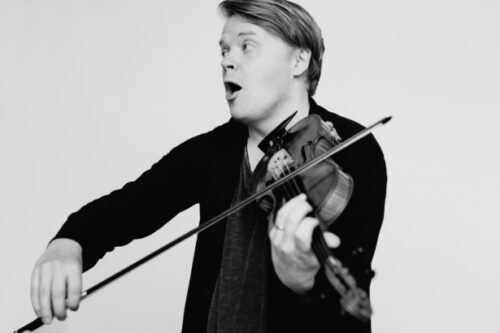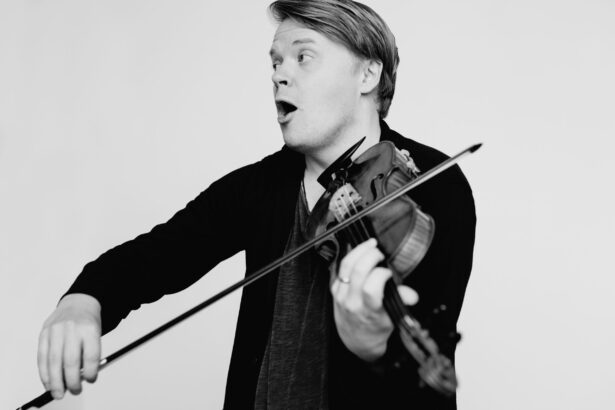 United Kingdom Muhly, Haydn, Britten: Allan Clayton (tenor), Scottish Chamber Orchestra / Pekka Kuusisto (violin / director). Queen’s Hall, Edinburgh, 16.3.2023. (SRT)
United Kingdom Muhly, Haydn, Britten: Allan Clayton (tenor), Scottish Chamber Orchestra / Pekka Kuusisto (violin / director). Queen’s Hall, Edinburgh, 16.3.2023. (SRT)

Muhly – Three Songs for Tenor and Violin; Violin Concerto ‘Shrink’ (Scottish premiere)
Haydn – Symphony No.104 ‘London’
Britten – Les Illuminations
Pekka Kuusisto has earned his stripes with the Scottish Chamber Orchestra. He isn’t just a virtuoso violinist; he is a top-notch conductor too, and his programmes are so originally conceived and daringly thought through that he now has a regular slot in the SCO’s season.
Two slots this year, in fact. After last week’s (slightly quixotic) pairing of a Janáček quartet and some Appalachian folk songs, this week saw him back at his free-thinking best with a programme that somehow managed to draw links between Haydn, Britten and Nico Muhly, and all with the aid of one of Britain’s finest singers. Let us begin at the end, with a heart-stoppingly brilliant performance of Les Illuminations in which the orchestra moved as one, the conductor’s vision was excitingly conceived, and the singer sounded supercharged. So pretty much perfect, then.
Allan Clayton is such a terrific vocal actor that anything he sings becomes a miniature opera, even if it is the mysterious surrealism of Rimbaud that so vividly caught Britten’s imagination. He sang with vocal power to pin you to the back of your seat in the opening Fanfare, but the voice is always so full of life and vigour that I suspect you would feel compelled if he was just singing his shopping list. The seascape of Marine and the townscape of Villes both pulsed with seemingly unstoppable life, while the slower songs had a touch of alluring beauty that seemed to make us listeners co-conspirators in an act of seduction. Kuusisto, directing from the Leader’s chair, forged the SCO strings into a sound that was both terrifically rich and fantastically exciting, but which also seemed to tell each song as its own distinct story. The confidence of the Fanfare seemed to melt palpably during the Interlude, and the final Départ felt like the most tender leave-taking imaginable. I am a sucker for this work in almost any performance – it captures the young Britten at his absolute best – but I am sure I have never heard a performance that held me so utterly gripped throughout.
Clayton was every bit as compelling in Nico Muhly’s Three Songs, where the clarity of his articulation meant that every word of the text was invested with its own life. That was particularly true in Part III where Muhly sets only selected words of the poem giving it a fragmented, surreal quality. Paradoxically, in Clayton’s hands, that made it more compelling and more involving than any conventional storytelling could do. Muhly scores the songs for drone, played here with seductive beauty on the harmonics of the SCO strings, over which Kuusisto’s solo violin danced and jigged to nuzzle the music forwards.
And that is where the link to Haydn comes in, because the finale of his London Symphony famously begins with a drone of its own, but it can rarely have sounded so crunch and messy as it did here, a wakeup call worthy of that in the Surprise symphony. This came as the end point of a terrifically robust performance that was peppered with individual touches like cheeky pauses or sleek tempo changes, Kuusisto finding fresh things even in the most familiar work of Papa Haydn.
I loved Muhly’s Violin Concerto somewhat less, though. Shrink was written for and dedicated to Kuusisto, and it reflects his personality very effectively because it’s a fizzing ball of energy that seems to shoot out in every direction as it unfolds. Sometimes as a burst of urban vigour, reminiscent of Britten’s Villes, and at others a bewitching web of gentle harmonies and misty textures. The problem is that it rarely seems to know its own mind: the piece is so episodic that it never seems to settle. Muhly writes that it is based around a series of different intervals that gradually come into focus, but the focus never quite seems to arrive. That’s a problem with a lot of Muhly’s work: its component parts are exciting and diverse, but for me it rarely coheres. I enjoyed this concert better as a vehicle for Kuusisto’s virtuosity rather than as a musical argument in itself. However, that carries a pleasure of its own, and I am already excited to see what Kuusisto brings with him on his next visit.
The concert was recorded for the BBC Radio 3 in Concert series and will be broadcast on 21 March 2023.
Simon Thompson
